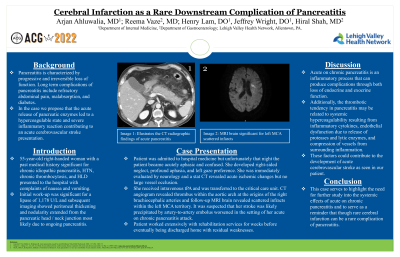Back


Poster Session B - Monday Morning
Category: Biliary/Pancreas
B0046 - Cerebral Infarction as a Rare Downstream Complication of Pancreatitis
Monday, October 24, 2022
10:00 AM – 12:00 PM ET
Location: Crown Ballroom

Has Audio
.jpg)
Arjan Ahluwalia, MD
Lehigh Valley Health Network
Allentown, PA
Presenting Author(s)
Arjan Ahluwalia, MD1, Reema Vaze, MD1, Henry Lam, DO1, Jeffrey Wright, DO1, Hiral Shah, MD2
1Lehigh Valley Health Network, Allentown, PA; 2LVHN/EPGI, Allentown, PA
Introduction: Pancreatitis is characterized by progressive and irreversible loss of function. Long term complications of pancreatitis include refractory abdominal pain, malabsorption, and diabetes. The downstream complications may also be systemic. In the case below we suggest that the acute release of pancreatic enzymes led to a hypercoagulable state and severe inflammatory reaction contributing to an acute cerebrovascular stroke presentation.
Case Description/Methods: 55-year-old right-handed woman with a past medical history significant for chronic idiopathic pancreatitis, HTN, chronic thrombocytosis, and HLD presented to the hospital with complaints of nausea and vomiting. Initial work-up was significant for a lipase of 1,178 U/L and subsequent imaging showed peritoneal thickening and nodularity extended from the pancreatic head / neck junction most likely due to ongoing pancreatitis. Patient was admitted to hospital medicine but unfortunately that night the patient became acutely aphasic and confused. She developed right-sided neglect, profound aphasia, and left gaze preference. She was immediately evaluated by neurology and a stat CT revealed acute ischemic changes but no large vessel occlusion. She received intravenous tPA and was transferred to the critical care unit. CT angiogram revealed thrombus within the aortic arch at the origins of the right brachiocephalic arteries and follow-up MRI brain revealed scattered infracts within the left MCA territory. It was suspected that her stroke was likely precipitated by artery-to-artery embolus worsened in the setting of her acute on chronic pancreatitis attack. Patient worked extensively with rehabilitation services for weeks before eventually being discharged home with residual weaknesses.
Discussion: Acute on chronic pancreatitis is an inflammatory process that can produce complications through both loss of endocrine and exocrine function. Additionally, the thrombotic tendency in pancreatitis may be related to systemic hypercoagulability resulting from inflammatory cytokines, endothelial dysfunction due to release of proteases and lytic enzymes, and compression of vessels from surrounding inflammation. These factors could contribute to the development of acute cerebrovascular stroke as seen in our patient. Furthermore, this case serves to highlight the need for further study into the systemic effects of acute on chronic pancreatitis and to serve as a reminder that though rare cerebral infarction can be a rare complication of pancreatitis.
Disclosures:
Arjan Ahluwalia, MD1, Reema Vaze, MD1, Henry Lam, DO1, Jeffrey Wright, DO1, Hiral Shah, MD2. B0046 - Cerebral Infarction as a Rare Downstream Complication of Pancreatitis, ACG 2022 Annual Scientific Meeting Abstracts. Charlotte, NC: American College of Gastroenterology.
1Lehigh Valley Health Network, Allentown, PA; 2LVHN/EPGI, Allentown, PA
Introduction: Pancreatitis is characterized by progressive and irreversible loss of function. Long term complications of pancreatitis include refractory abdominal pain, malabsorption, and diabetes. The downstream complications may also be systemic. In the case below we suggest that the acute release of pancreatic enzymes led to a hypercoagulable state and severe inflammatory reaction contributing to an acute cerebrovascular stroke presentation.
Case Description/Methods: 55-year-old right-handed woman with a past medical history significant for chronic idiopathic pancreatitis, HTN, chronic thrombocytosis, and HLD presented to the hospital with complaints of nausea and vomiting. Initial work-up was significant for a lipase of 1,178 U/L and subsequent imaging showed peritoneal thickening and nodularity extended from the pancreatic head / neck junction most likely due to ongoing pancreatitis. Patient was admitted to hospital medicine but unfortunately that night the patient became acutely aphasic and confused. She developed right-sided neglect, profound aphasia, and left gaze preference. She was immediately evaluated by neurology and a stat CT revealed acute ischemic changes but no large vessel occlusion. She received intravenous tPA and was transferred to the critical care unit. CT angiogram revealed thrombus within the aortic arch at the origins of the right brachiocephalic arteries and follow-up MRI brain revealed scattered infracts within the left MCA territory. It was suspected that her stroke was likely precipitated by artery-to-artery embolus worsened in the setting of her acute on chronic pancreatitis attack. Patient worked extensively with rehabilitation services for weeks before eventually being discharged home with residual weaknesses.
Discussion: Acute on chronic pancreatitis is an inflammatory process that can produce complications through both loss of endocrine and exocrine function. Additionally, the thrombotic tendency in pancreatitis may be related to systemic hypercoagulability resulting from inflammatory cytokines, endothelial dysfunction due to release of proteases and lytic enzymes, and compression of vessels from surrounding inflammation. These factors could contribute to the development of acute cerebrovascular stroke as seen in our patient. Furthermore, this case serves to highlight the need for further study into the systemic effects of acute on chronic pancreatitis and to serve as a reminder that though rare cerebral infarction can be a rare complication of pancreatitis.
Disclosures:
Arjan Ahluwalia indicated no relevant financial relationships.
Reema Vaze indicated no relevant financial relationships.
Henry Lam indicated no relevant financial relationships.
Jeffrey Wright indicated no relevant financial relationships.
Hiral Shah: Abbvie – Speakers Bureau.
Arjan Ahluwalia, MD1, Reema Vaze, MD1, Henry Lam, DO1, Jeffrey Wright, DO1, Hiral Shah, MD2. B0046 - Cerebral Infarction as a Rare Downstream Complication of Pancreatitis, ACG 2022 Annual Scientific Meeting Abstracts. Charlotte, NC: American College of Gastroenterology.
